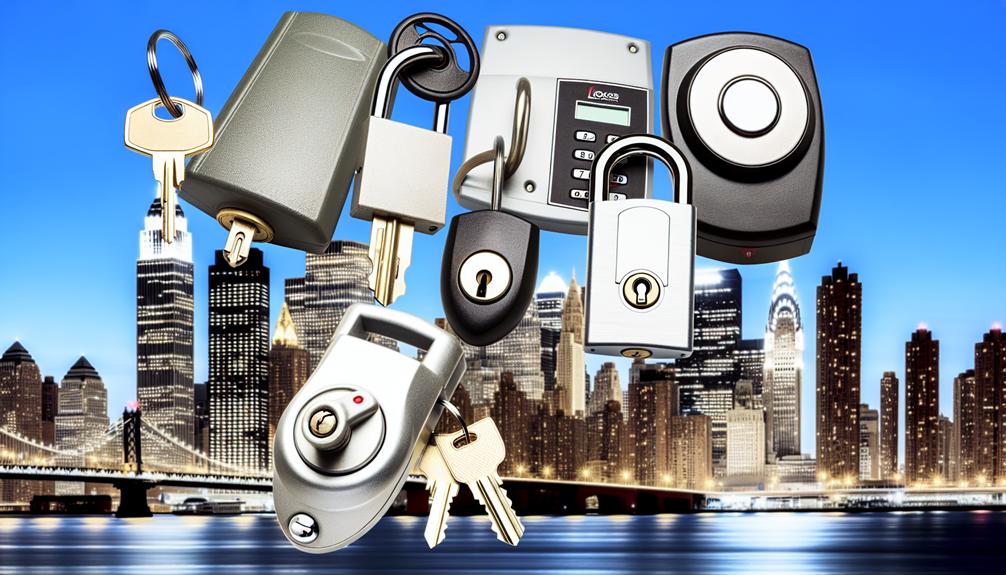Choosing the right commercial locks for your New Jersey business starts with a thorough security assessment. We should evaluate vulnerabilities, premises layout, and specific threats. Keyed entry locks and master keying systems offer robust access control, while keyless entry systems and biometric locks provide flexibility and advanced security. High-security locks with patented keyways and tamper-resistant mechanisms are essential for critical areas. Deadbolts and reinforced strike plates provide durable, tamper-resistant solutions. Grade 1 or 2 locks are ideal for high-security needs. Professional installation and routine maintenance ensure peak lock performance. Discover more nuanced options to fortify your premises effectively.
Key Takeaways
- Assess your business’s specific security needs and potential vulnerabilities to determine the appropriate level of protection.
- Consider high-security locks that resist tampering, picking, and forceful entry for robust physical security.
- Implement keyless entry systems or smart locks for flexible access control and remote management.
- Use deadbolts and reinforced strike plates for additional protection against forced entry.
- Regularly update firmware and perform routine diagnostics to maintain optimal security system performance and resilience.
Assess Your Security Needs
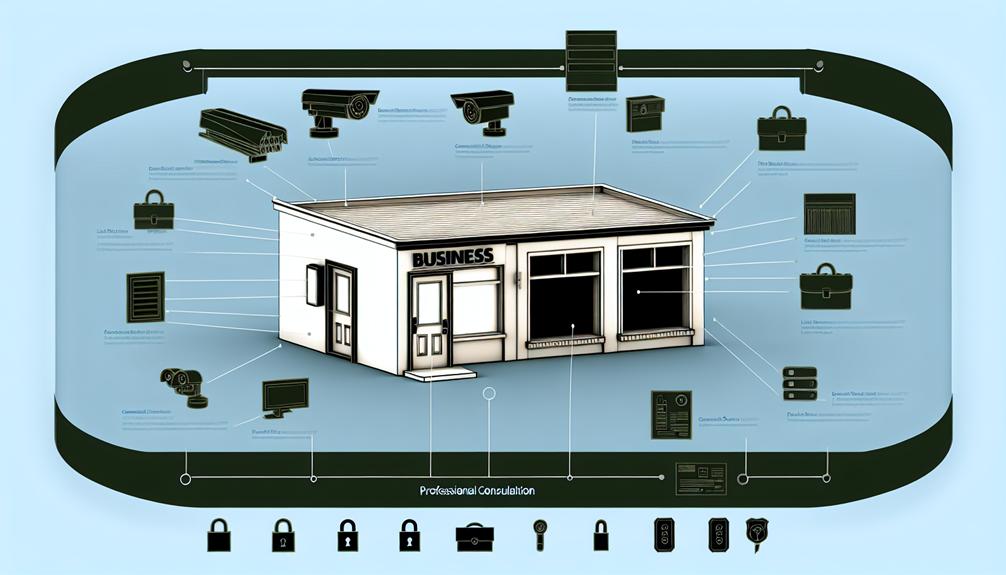
Before selecting commercial locks for your New Jersey business, we must thoroughly assess our security needs to identify potential vulnerabilities and determine the appropriate level of protection required. A detailed security assessment involves evaluating both internal and external risk factors.
We’ll start by examining the physical layout of our premises, focusing on entry points, windows, and any areas that might be susceptible to unauthorized access.
Next, we need to perform a risk evaluation to understand the specific threats our business may face. This includes considering the likelihood of break-ins, vandalism, and even internal threats from employees. By identifying these risks, we can prioritize which areas require the most robust security measures.
We should also assess our current security protocols. Are our existing locks and access control systems adequate, or are there gaps that could be exploited? This step often involves consulting with security professionals who can provide expert advice on potential weaknesses and recommend improvements.
Types of Commercial Locks
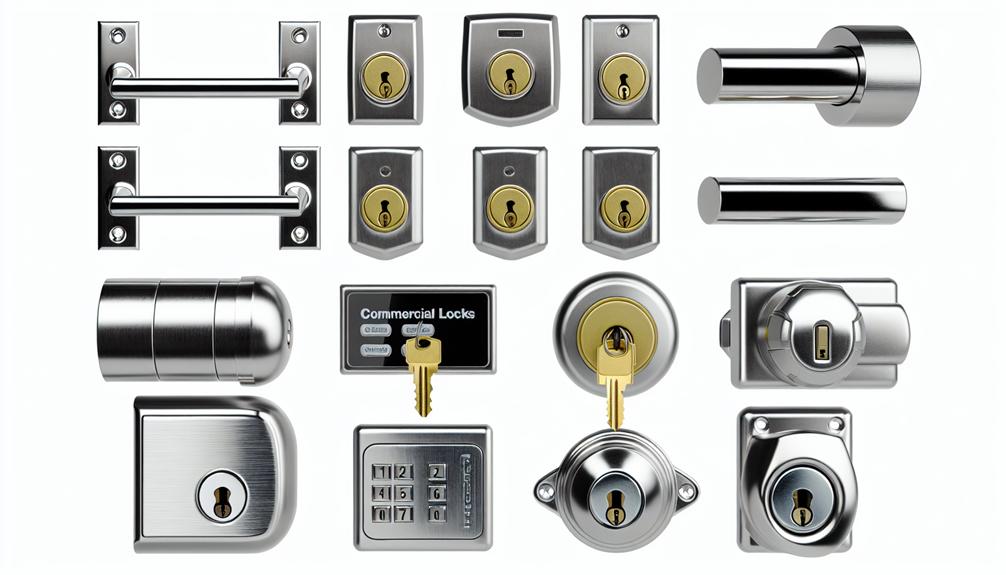
Let’s explore the types of commercial locks to determine the best fit for our business.
We’ll evaluate keyed entry locks, keyless entry systems, and high-security locks, each offering unique benefits and potential risks.
Understanding these options is essential for making informed decisions that enhance our security infrastructure.
Keyed Entry Locks
Keyed entry locks, a fundamental component of commercial security systems, offer varying levels of protection and functionality tailored to specific business needs. By opting for keyed entry locks, we gain control over access and guarantee that only authorized personnel can enter specific areas of our business premises.
One critical advantage of these locks is the ability to implement master keying systems. Master keying allows us to create a hierarchy of access levels, giving certain employees broader access while restricting others. This is particularly useful in larger establishments where different departments need varying levels of security. However, we must remain vigilant about key duplication, as unauthorized copies can compromise security.
Lock rekeying is another essential feature. If an employee leaves or a key is lost, we can rekey the locks to prevent unauthorized access without the need to replace the entire locking mechanism. This maintains robust key control—a key aspect of maintaining a secure environment.
Keyless Entry Systems
Embracing the advancements in security technology, keyless entry systems offer a sophisticated and flexible approach to controlling access within commercial properties. By leveraging wireless technology, these systems eliminate the need for traditional keys, thereby reducing the risk of unauthorized duplication and enhancing overall security.
Keyless entry systems come in various forms, including keypad locks, biometric scanners, and RFID card readers. Each option provides unique benefits, allowing us to tailor security solutions to our specific needs. For instance, biometric scanners use fingerprints or retinal scans, offering a high degree of security by ensuring only authorized personnel gain access.
One of the significant advantages of keyless entry systems is remote access. With remote access capabilities, we can manage and monitor entry points from anywhere, granting or revoking permissions in real time. This level of control is particularly beneficial for businesses with multiple locations or high employee turnover, as it simplifies administrative tasks and improves operational efficiency.
However, it’s essential to assess potential risks, such as cybersecurity vulnerabilities. Regular software updates and strong encryption protocols are vital to safeguarding our systems against potential threats.
High-Security Locks
While keyless entry systems offer modern convenience, high-security locks remain a cornerstone of strong physical security for commercial properties. We grasp the importance of maintaining control over access points, and high-security locks excel in reducing risks such as lock picking and lock bumping. These locks incorporate advanced mechanisms designed to thwart unauthorized entry and greatly minimize security vulnerabilities.
High-security locks often feature intricate pin configurations and reinforced materials, making them extremely resistant to tampering. Additionally, they come with patented keyways that prevent unauthorized key duplication. This means only authorized personnel can copy keys, further reducing the risk of internal breaches.
When we select high-security locks, we’re investing in a strong defense against both physical and covert attacks. For example, locks with drill-resistant plates and hardened steel inserts provide additional layers of protection against forceful entry attempts. Furthermore, electronic high-security locks can integrate with existing security systems, offering real-time monitoring and alerts.
In a business environment where security is non-negotiable, high-security locks offer peace of mind. They guarantee that your New Jersey business remains protected against sophisticated break-in techniques and unauthorized access, providing a reliable safeguard for your assets.
Deadbolts
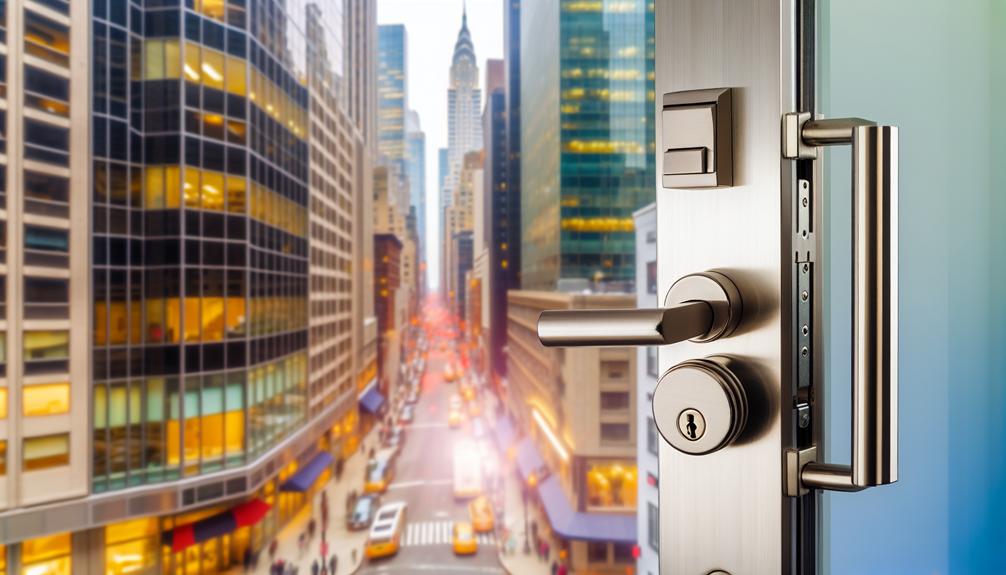
Deadbolts offer a vital layer of security for businesses by providing a durable and tamper-resistant locking mechanism. When we consider lock installation for our New Jersey business, it’s important to evaluate the specific security features of deadbolts.
These locks are engineered to resist forced entry, utilizing hardened steel bolts that extend deep into the door frame, making them much harder to bypass compared to standard locks.
From a risk assessment perspective, deadbolts provide a higher level of control against common break-in methods like kick-ins and lock picking. The installation process is straightforward but must be precise to guarantee maximum effectiveness.
For instance, a deadbolt should be installed at a height that mitigates leverage attacks and should be used in conjunction with a reinforced strike plate.
Lever Handle Locks
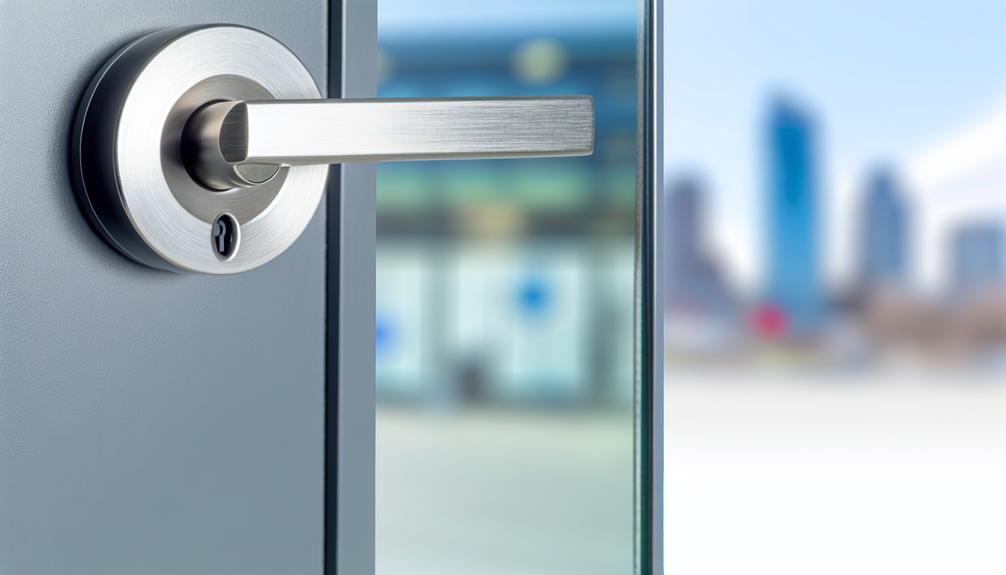
When evaluating lever handle locks, we must assess their durability and security features, including resistance to forced entry and wear and tear.
Additionally, we should consider the aesthetic and design aspects to guarantee they align with our business’s professional appearance.
Durability and Security
Lever handle locks, renowned for their ergonomic design, offer exceptional strength and enhanced security for commercial properties. When selecting commercial locks, we must consider security durability and how these locks withstand both physical and environmental challenges.
Lever handle locks excel in this regard, providing a robust defense mechanism against forced entry attempts, thanks to their solid internal mechanisms and high-strength materials.
In our risk assessment, we find that lever handle locks incorporate advanced security features such as anti-pick pins, drill-resistant housings, and reinforced strike plates. These components greatly elevate their protective capabilities, making them a top choice for businesses that prioritize security.
Additionally, the longevity of these locks guarantees that we won’t need frequent replacements, translating to long-term cost savings.
While aesthetics play a role in the overall selection process, it’s the security durability of lever handle locks that truly sets them apart. Their ability to endure rigorous daily use without compromising their structural integrity makes them ideal for high-traffic areas within our commercial spaces.
Aesthetic and Design
How do we balance strong security features with sophisticated design when choosing lever handle locks for our commercial properties? It’s essential to select locks that offer both a modern design and reliable security. Lever handle locks provide a sleek appearance, enhancing the aesthetic appeal of our premises while simultaneously guaranteeing high security standards.
When evaluating lever handle locks, we need to take into account the following aspects:
| Feature | Description |
|---|---|
| Material | High-quality metals like stainless steel offer durability and a modern look. |
| Finish Options | Matte, polished, or satin finishes can complement various interior designs. |
| Mechanism Quality | Look for advanced locking mechanisms that resist tampering and picking. |
| Ergonomic Design | Ensure the lever handles are user-friendly and comply with ADA standards. |
| Brand Reputation | Opt for brands known for combining aesthetics with excellent security. |
Smart Locks
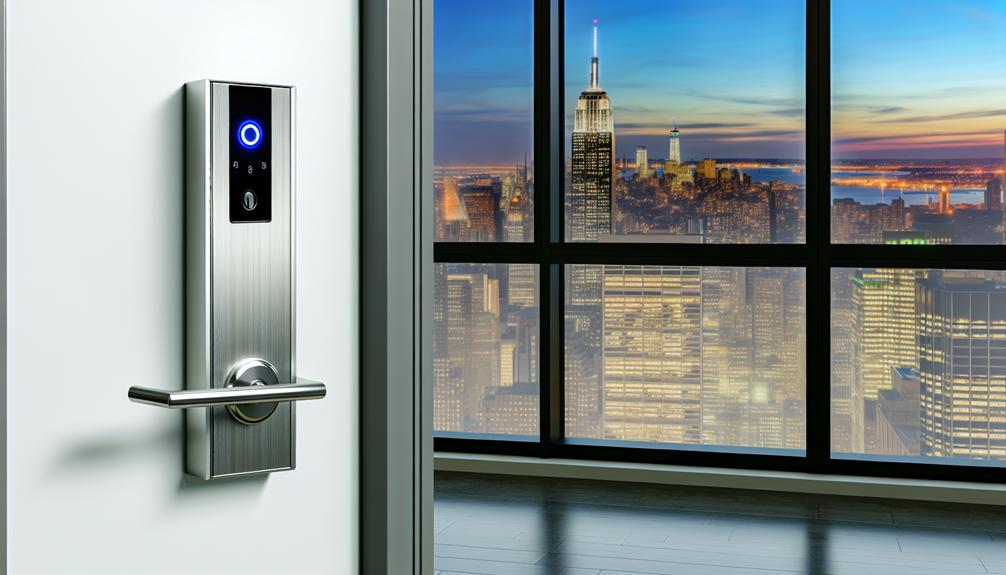
Integrating intelligent locks into your New Jersey business’s security system offers advanced features such as remote access, real-time monitoring, and user-specific entry codes, guaranteeing a higher level of control and security. These advanced devices are a game-changer in security automation, allowing us to manage access seamlessly and efficiently.
By incorporating intelligent locks, businesses can benefit from:
- Remote access: Control lock and open functions from anywhere via a secure app, offering flexibility and immediate response to access needs.
- User-specific entry codes: Assign unique codes to employees, contractors, or visitors, enabling precise tracking of individuals who enter and exit the premises.
- Real-time monitoring: Receive instant notifications of any unauthorized access attempts, enabling prompt action to mitigate potential security breaches.
Intelligent locks not only enhance security but also streamline operations. For example, integrating them with other security systems like cameras or alarm systems provides a comprehensive security solution.
However, we must consider potential risks such as cybersecurity threats. It’s crucial to select smart locks with robust encryption and regularly update firmware to address vulnerabilities.
Investing in smart locks means adopting a proactive approach to security, equipping us with the tools to maintain control and safeguard the security of our business assets.
Keyless Entry Systems
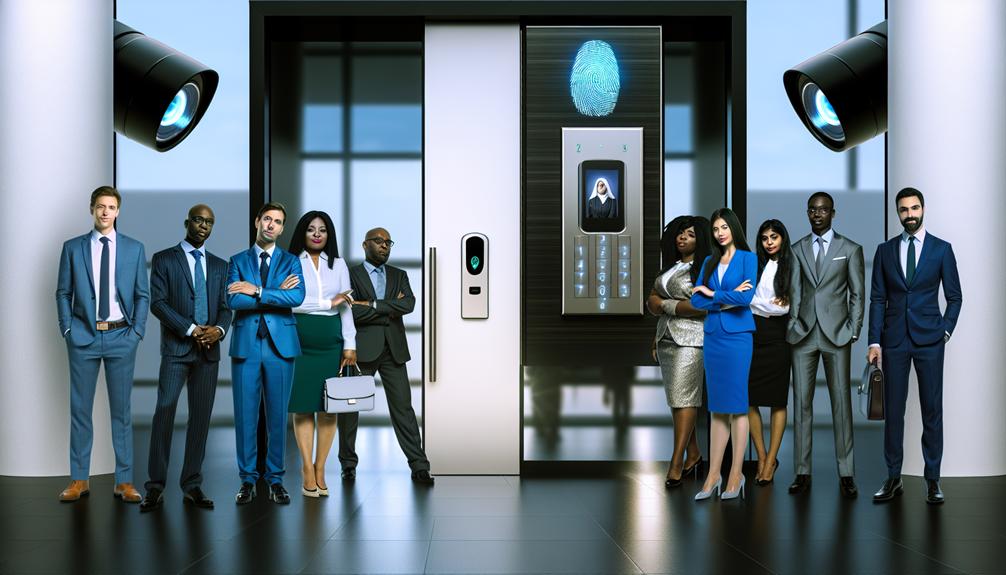
Building on the benefits of smart locks, keyless entry systems offer an additional layer of convenience and security by eliminating the need for physical keys altogether. With keyless entry, we can leverage remote access capabilities to manage and monitor entry points from virtually anywhere. This offers us unparalleled control over who enters our premises and when, greatly enhancing our security protocols.
One of the standout features of these systems is the level of security customization available. We can set unique access codes for different employees, granting or revoking access in real-time. This allows us to tailor security measures to fit our specific operational needs, reducing the risk of unauthorized access and internal security breaches.
Furthermore, keyless entry systems are integrated with robust auditing features, enabling us to track and log entry attempts. This audit trail is invaluable for identifying potential security vulnerabilities and ensuring compliance with regulatory standards.
However, it’s essential to assess the risks involved. Dependence on electronic systems means we must consider cybersecurity measures to protect against hacking attempts. Ensuring that our keyless entry system is regularly updated and maintained is vital for safeguarding our business assets.
Biometric Locks
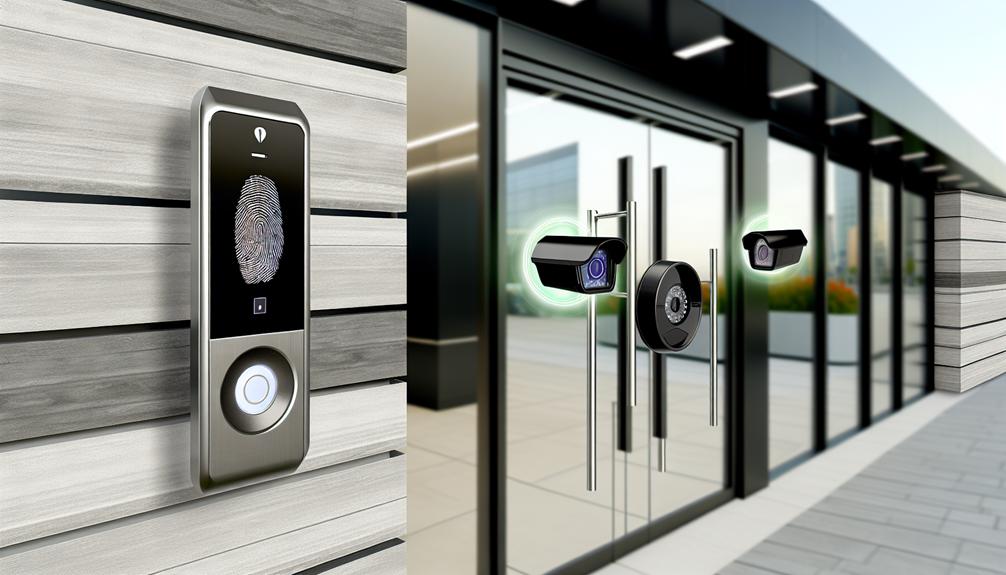
When we consider biometric locks, we’re looking at unmatched security features that utilize unique physiological traits. These systems not only enhance access control efficiency but also reduce the risk of unauthorized entry.
However, we must assess the installation and maintenance complexities to guarantee seamless integration into our security infrastructure.
Enhanced Security Features
Biometric locks offer an advanced level of security by using unique biological traits like fingerprints or retinal scans to control access. With technology integration, these locks provide advanced security by guaranteeing only authorized personnel can gain entry. Leveraging biometric data markedly reduces the risk of unauthorized access, making it an excellent choice for any New Jersey business aiming to protect sensitive areas.
Let’s break down some of the key benefits of biometric locks:
- Advanced Security: By utilizing biometric data, these locks offer a higher level of security compared to traditional key or code-based systems.
- Technology Integration: They can easily be integrated with existing security systems, allowing for seamless management and monitoring.
- Remote Access: Many biometric locks come with remote access and convenience features, enabling us to manage entry points from anywhere using a smartphone or computer.
When we invest in biometric technology, we’re enhancing our security infrastructure while also adding a layer of convenience. The ability to control access remotely ensures that we can respond quickly to security breaches or grant access as needed without being physically present. This combination of advanced security and convenience features makes biometric locks a top-tier choice for modern businesses.
Access Control Efficiency
Access control efficiency with biometric locks hinges on their ability to swiftly authenticate users while minimizing the risk of unauthorized entry. In our pursuit of top-notch security, biometric systems offer unparalleled access control integration. They use unique physiological traits such as fingerprints, facial recognition, or iris scans to ensure precise employee identification. This minimizes the vulnerabilities associated with traditional key-based systems, where keys can be lost or duplicated.
From a risk assessment perspective, biometric locks fortify our security protocols by reducing the chances of unauthorized access. Unlike traditional PINs or swipe cards, biometric data is exceedingly difficult to replicate, thereby enhancing the reliability of our security measures. Additionally, these systems streamline visitor management. Pre-authorized guests can be registered in the database, allowing for effortless and secure access without the need for physical keys or badges.
The efficiency of biometric locks also lies in their ability to quickly process and authenticate identities, reducing bottlenecks at entry points. This seamless operation not only improves security but also boosts overall operational efficiency.
For businesses in New Jersey, integrating these advanced systems assures a robust, scalable, and future-proof security infrastructure, giving us greater control over who enters our premises.
Installation and Maintenance
Maximizing the security benefits and operational efficiency of biometric locks relies on the seamless installation and ongoing maintenance. When we set up biometric locks, we need to take into account the complexity of the technology and the critical significance of ongoing lock maintenance. A poorly set up biometric system can jeopardize security and result in operational disruptions.
For those of us who prefer DIY installation, it’s important to follow the manufacturer’s guidelines meticulously. However, engaging professional locksmith services can reduce potential installation errors and guarantee peak performance. Regular maintenance and security upgrades are equally important, as biometric systems can be susceptible to wear and technological obsolescence.
- Professional calibration: Ensures precise biometric readings and minimizes false rejections or acceptances.
- Firmware updates: Regularly updating the system’s software prevents vulnerabilities and enhances security features.
- Routine diagnostics: Performing periodic checks can identify and resolve issues before they escalate into significant security risks.
Magnetic Locks
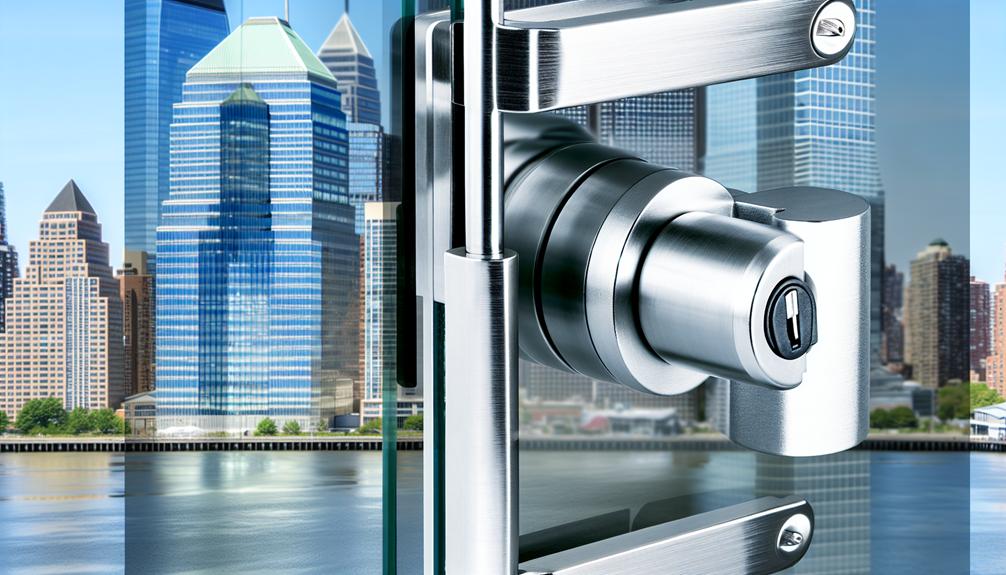
Magnetic locks offer a secure and efficient option for controlling access to your New Jersey business premises through electromagnetic force. These locks provide a robust solution by leveraging a magnetic field to secure doors, ensuring that unauthorized entry is greatly minimized. They’re particularly effective for high-traffic areas where traditional key-based systems might falter.
One of the primary advantages of magnetic locks is their energy efficiency. Unlike mechanical locks, which may wear out over time, magnetic locks require minimal maintenance and use less energy, especially when paired with a fail-safe or fail-secure mechanism. This not only contributes to sustainability but also enhances cost-effectiveness in the long term by reducing the need for frequent replacements and repairs.
In terms of risk assessment, magnetic locks offer high-security levels, especially when integrated with access control systems. They can be easily monitored and managed remotely, providing us with real-time control over who enters and exits our premises. Additionally, these locks can be combined with other security measures such as CCTV and alarm systems for a thorough security solution.
Electric Strike Locks
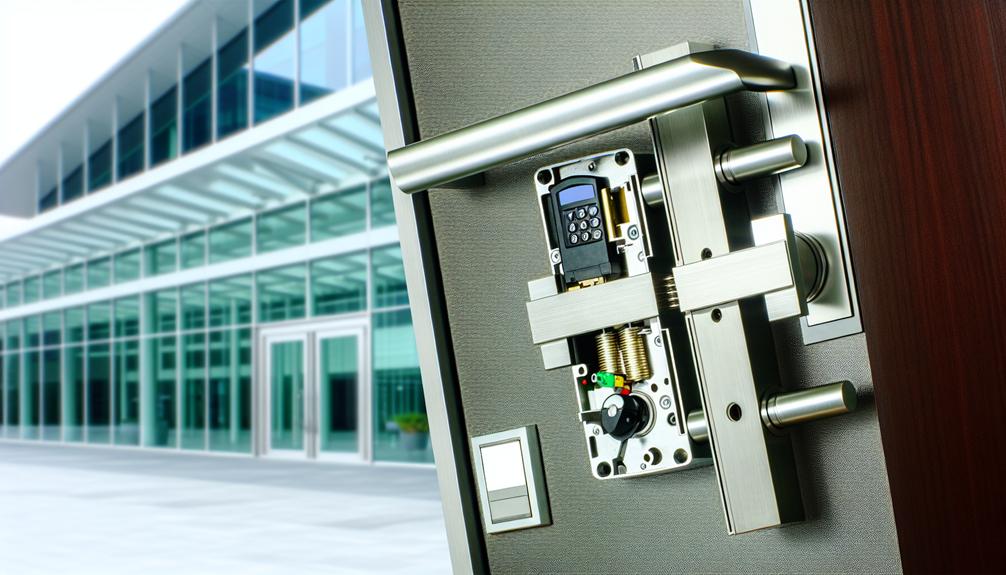
Let’s analyze the enhanced security features of electric strike locks and their implications for our business.
We’ll focus on the technical aspects of installation and maintenance, as these are critical for ensuring the lock’s reliability and longevity.
Enhanced Security Features
Electric strike locks offer a sturdy solution for businesses seeking enhanced security features, integrating seamlessly with access control systems to provide reliable and controlled entry. By incorporating security integration and leveraging technology advancements, we can guarantee a higher level of protection for our commercial spaces.
Electric strike locks enable us to regulate who can enter specific areas within our business premises. By doing so, we mitigate risks and enhance overall security. These locks are particularly effective because they’re compatible with various access control methods, such as keycards, biometric scanners, and PIN pads. This versatility allows us to choose the system that best fits our security needs.
Increased Durability: Electric strike locks are constructed to withstand tampering and forced entry, offering a more resilient solution compared to traditional locks.
Remote Access Control: We can manage and monitor entry points remotely, providing flexibility and enhanced security management.
Audit Trails: These systems often include logging features, allowing us to track access attempts and identify potential security breaches.
Installation and Maintenance
When installing electric strike locks, accurate alignment between the strike plate and latch is essential for the best functionality and security. Precision in alignment minimizes wear and tear and guarantees maximum lock effectiveness. We must adhere to installation best practices, such as verifying the strike plate’s position and ensuring the door and frame are correctly aligned.
Misalignment not only jeopardizes security but can also lead to frequent malfunctions, necessitating costly repairs.
Lock maintenance is vital in preserving the integrity of electric strike locks. Regular inspections and timely security upgrades can prevent potential breaches. We should routinely check for signs of wear, ensure electrical connections remain secure, and test the lock’s operation.
A poorly maintained lock can become a weak point in our overall security infrastructure.
For optimal results, following professional locksmith recommendations is advisable. Expert locksmiths bring valuable insights into the nuances of electric strike lock installation and maintenance. They can identify potential issues early and suggest appropriate security upgrades, ensuring our business remains protected.
Panic Bars
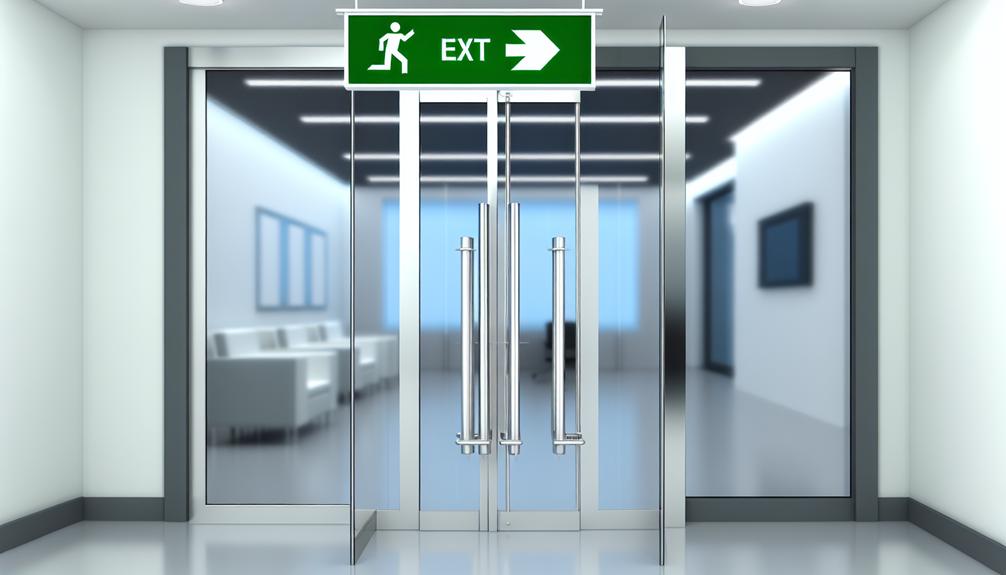
Panic bars, integral to emergency egress systems, guarantee swift and safe evacuation during critical situations. As business owners in New Jersey, we must prioritize the installation of these devices to confirm compliance with safety regulations and provide a secure emergency exit for our employees and customers.
Panic bars aren’t merely a legal requirement; they’re a vital component of our overall safety strategy. Here’s why:
- Immediate Egress: In emergencies, panic bars allow for rapid and unimpeded exit, reducing the risk of injury or fatality.
- Regulatory Compliance: Adhering to local and national safety standards, including OSHA and NFPA, is non-negotiable. Panic bars help us meet these strict safety regulations.
- Low Maintenance: These devices are designed for durability, requiring minimal upkeep to remain operational and compliant with ongoing compliance requirements.
We must also remember that regular maintenance and periodic inspections of panic bars are essential to confirm they function correctly during an emergency. Non-compliance can lead to severe fines and increased liability risks.
High-Security Locks
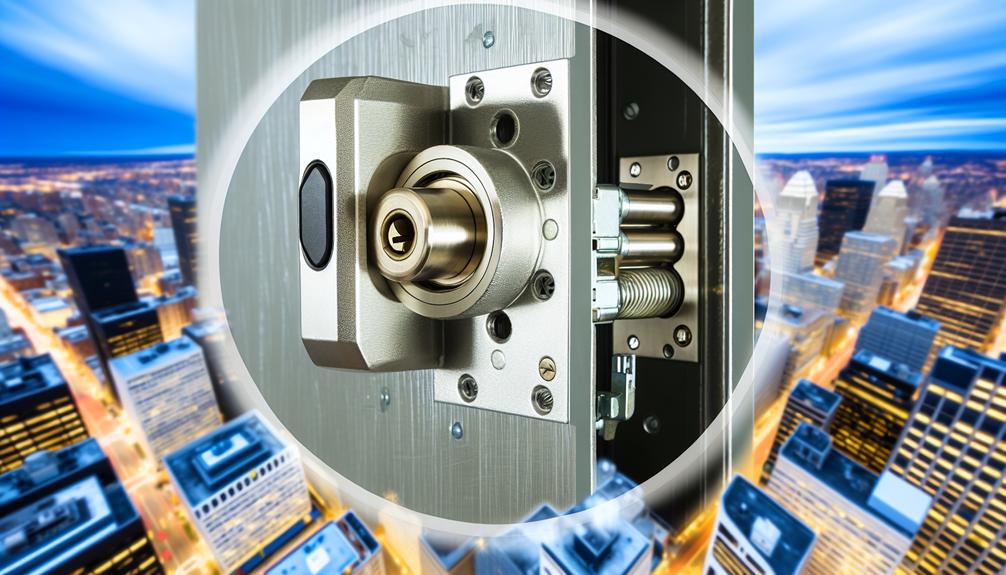
High-security locks are vital for protecting our New Jersey businesses from unauthorized access and potential security breaches. These locks offer advanced security features such as drill resistance, pick resistance, and key control to guarantee that only authorized personnel can gain entry. By incorporating hardened steel inserts and complex keyways, high-security locks greatly reduce the risk of forced entry, thus safeguarding our assets and sensitive information.
When evaluating high-security locks, we must consider the specific needs of our business environment. For example, locks with restricted key systems can prevent unauthorized key duplication, giving us greater control over access. Additionally, electronic high-security locks with audit trails enable us to monitor and track access attempts, adding another layer of security.
The installation process for high-security locks is equally important. It’s crucial that we work with professional locksmiths who have expertise in handling these complex systems. Improper installation can compromise the lock’s effectiveness, leaving our business vulnerable. Hence, ensuring that the locks are installed correctly not only maximizes their security features but also extends their lifespan.
Lock Grades and Standards
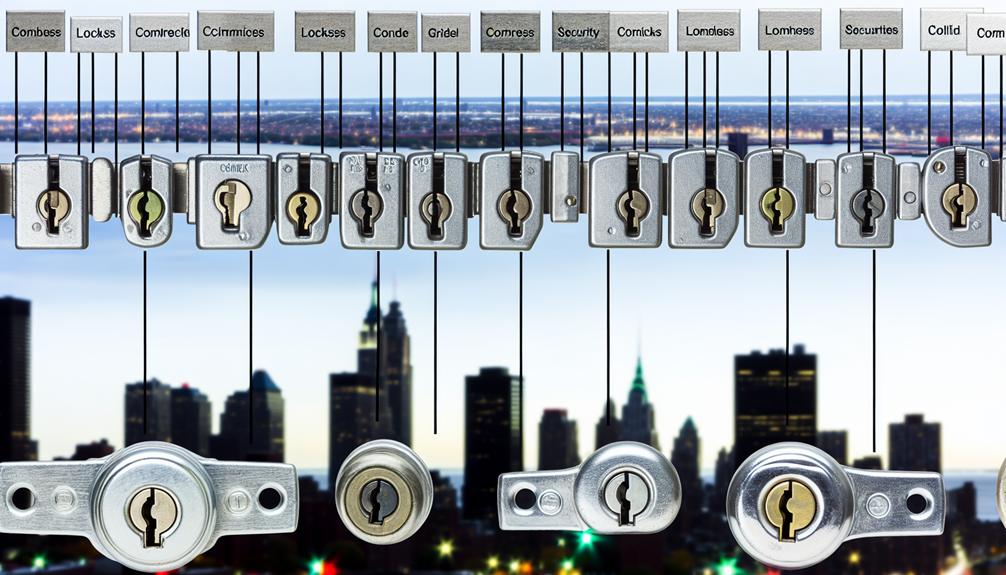
Understanding lock grades and standards is essential for selecting the most appropriate security solutions for our New Jersey business. Lock grades, established by the American National Standards Institute (ANSI) and Builders Hardware Manufacturers Association (BHMA), offer a clear measure of lock durability and security standards. These grades help us assess which locks are most suitable for different areas of our business, ensuring that we maintain control over access points and mitigate potential risks.
Locks are typically categorized into three grades:
- Grade 1: These locks provide the highest level of security and durability. They’re ideal for high-traffic areas and critical entry points.
- Grade 2: While not as robust as Grade 1, these locks still offer substantial security and are suitable for medium-traffic areas.
- Grade 3: These locks meet basic security standards and are best for low-traffic, low-risk areas.
Budget Considerations
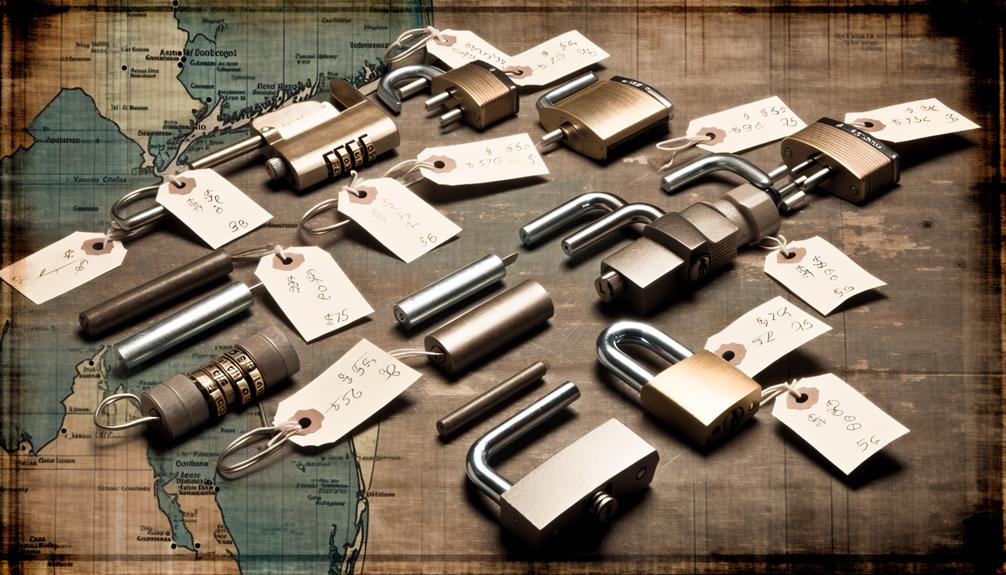
When planning our commercial lock investment, it’s important to balance security needs with budget constraints to guarantee cost-effectiveness without compromising safety. We must carefully evaluate cost saving options and affordable solutions to guarantee we achieve both security and fiscal prudence.
A primary strategy involves differentiating between necessary high-security areas and locations with lower risk profiles. By matching lock grades to specific security needs, we avoid unnecessary expenditures on over-specification. Leveraging bulk purchase discounts and considering locks with longer warranties can also yield significant savings over time.
| Security Feature | High-Security Areas | Low-Risk Areas |
|---|---|---|
| Lock Grade | Grade 1 or 2 | Grade 3 |
| Installation Cost | Higher due to complexity | Lower due to simplicity |
| Durability | High | Moderate |
| Maintenance Frequency | Low | Moderate |
| Cost Saving Options | Bulk purchase discounts | Affordable solutions |
Choosing the right balance between high-grade locks for critical areas and more affordable solutions for lesser security zones is essential. This risk assessment guarantees that we are not overspending where it’s not necessary, yet maintaining robust protection where it counts the most. Consequently, our commercial lock investment becomes a strategic, well-calculated expense rather than an overwhelming financial burden.
Professional Installation
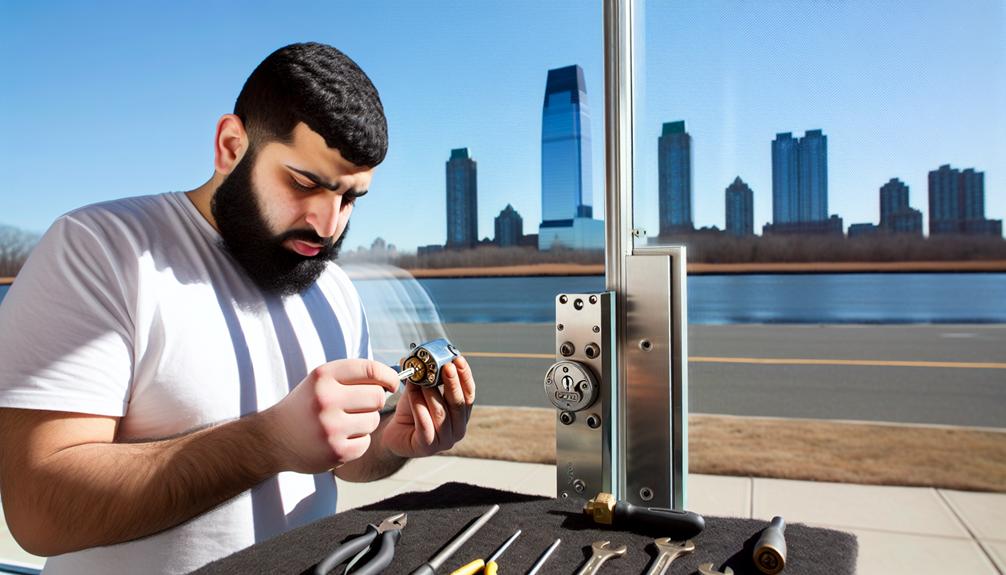
Selecting professional installation ensures that our investment in commercial locks operates optimally, minimizing the risk of security breaches due to improper setup. When we rely on experts for the installation, we guarantee that every lock is fitted accurately, adhering to the manufacturer’s specifications and industry standards. This not only enhances the security but also extends the lifespan of our locking systems.
A thorough security assessment is an essential component of professional installation. Experts evaluate our premises to identify potential vulnerabilities and recommend the most suitable locking mechanisms. This tailored approach provides us with a robust security framework that standard solutions can’t match.
- Precision: Professional installers use specialized tools and techniques, to ensure each lock functions perfectly.
- Compliance: Adherence to local codes and regulations is assured, mitigating legal risks.
- Integration: Seamless incorporation with existing security systems enhances overall protection.
Choosing professional installation also includes a detailed security assessment, pinpointing weaknesses and fortifying our defenses. We gain peace of mind knowing that our commercial locks are optimized for maximum security.
Maintenance and Upkeep
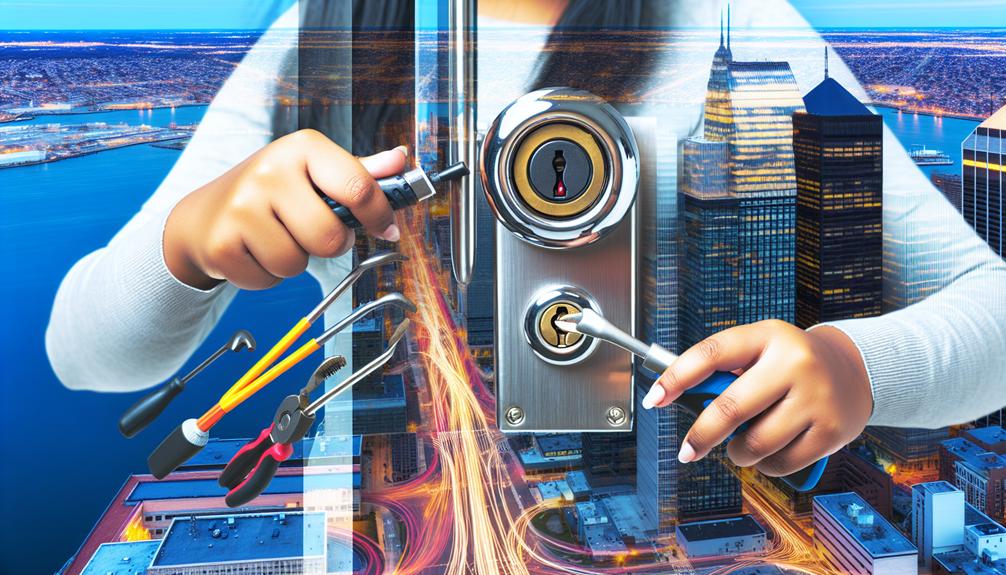
Regular maintenance and upkeep of our commercial locks are vital to preserving their functionality and maintaining continuous security. Establishing an upkeep schedule is crucial; it involves periodic lock maintenance and security checks that anticipate potential failures. By adhering to this schedule, we reduce risks like unauthorized access or lock malfunctions, keeping our business secure.
An integral part of this process is engaging professional service providers. These experts conduct thorough inspections, identifying wear and tear that mightn’t be obvious to the untrained eye. They also perform necessary tasks such as lubricating moving parts, tightening loose components, and realigning misaligned mechanisms. This level of detail ensures that our locks function optimally and have an extended lifespan.
Additionally, routine security checks play a significant role. These checks involve testing the locks for vulnerabilities, ensuring that each lock operates smoothly without sticking or jamming. It’s important to verify that all electronic locks are updated with the latest firmware to prevent cyber threats.
Frequently Asked Questions
Are There Any Legal Regulations for Commercial Locks in New Jersey?
Yes, there are legal regulations for commercial locks in New Jersey. We must verify locksmith certification and compliance with building code requirements to maintain security and avoid penalties. Evaluating risks and adhering to standards gives us control.
How Can I Ensure My Commercial Locks Are ADA-compliant?
Did you know 26% of Americans live with a disability? When choosing commercial locks, ensuring ADA compliance involves proper installation and regular maintenance. This reduces legal risks and enhances accessibility, giving us greater control over our security measures.
What Should I Do if a Key or Access Device Is Lost or Stolen?
We should immediately start the essential replacement process and enhance access device security. Employee training on emergency protocol is vital to mitigate risks. Regular audits and assessments guarantee robust security measures are maintained, minimizing potential vulnerabilities.
Can I Integrate Commercial Locks With My Existing Security System?
Absolutely, we can integrate commercial locks with our existing security system. Integrating security systems with advanced access control systems enhances control, mitigates security risks, and provides seamless management. It guarantees every aspect of security is interconnected and robust.
What Are Some Common Mistakes to Avoid When Choosing Commercial Locks?
We must avoid compromising lock quality, making installation errors, neglecting a regular maintenance schedule, and underestimating security risks. These common mistakes can greatly undermine the effectiveness of our commercial locks, exposing us to potential breaches.
Conclusion
In choosing the right commercial locks for your New Jersey business, we must assess our security needs meticulously, much like Sherlock Holmes solving a complex case.
By understanding the various types of locks—deadbolts, lever handle locks, and smart locks—and considering lock grades, budget constraints, and professional installation, we can fortify our premises effectively.
Remember, proactive maintenance is key to ensuring our locks remain as reliable as the vaults of Fort Knox.

